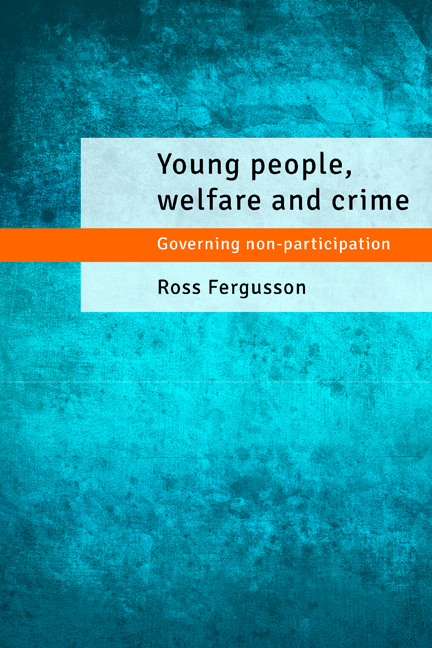Book contents
- Frontmatter
- Dedication
- Contents
- Detailed contents
- List of figures and tables
- List of abbreviations
- About the author
- Acknowledgements
- Part One The crisis of non-participation
- Part Two Work, welfare and crime: research and policy
- Part Three Theorising non-participation
- Part Four Criminalising non-participation
- References
- Copyright material
- Index
Three - Non-participation, wages and welfare
Published online by Cambridge University Press: 01 September 2022
- Frontmatter
- Dedication
- Contents
- Detailed contents
- List of figures and tables
- List of abbreviations
- About the author
- Acknowledgements
- Part One The crisis of non-participation
- Part Two Work, welfare and crime: research and policy
- Part Three Theorising non-participation
- Part Four Criminalising non-participation
- References
- Copyright material
- Index
Summary
The world’s youth, more than 1 billion aged between 15 and 25, comprise the largest youth cohort in history, a majority in developing countries. The world may be ageing but there are a very large number of young people around, with much to be frustrated about. Although many other groups make up the precariat, the most common image is of young people emerging from school and college to enter a precarious existence lasting years, often made all the more frustrating because their parents’ generation had seemingly held stable jobs. Youth make up the core of the precariat and will have to take the lead in forging a future for it.
Guy Standing (2011) The precariat: The new dangerous class, pp 65-6Introduction
Mass non-participation among young people now has some claim to being endemic, transnational and ubiquitous. In 2013 just over 3 million of the 7.2 million young people aged 16 to 24 in the UK were in full-time education, 637,000 were unemployed and 664,000 were classified as economically inactive (House of Commons Library, 2014). This suggests that 18% of the young population are non-participant, as defined in Chapter One. Youth unemployment in the UK has been in excess of half a million since the early 1980s, fluctuating between 10% and 20% of 16 to 24-year-olds. Troughs and peaks in total numbers and the unemployment rate coincide precisely with the global financial crisis (GFC), but with no recovery visible in the sustained maximum 13% rate. In several European countries (see Chapter One), many more than half of young people were unemployed. These figures do not include young people who are invisible to systems of recording, who avoid them or who work without pay.
This chapter charts the changing profile of mass non-participation in and beyond the UK since the late 1970s. The first three sections locate profiles of non-participation in conditions that are shaped by growing gaps that separate levels of youth and adult unemployment; the mean incomes and minimum pay which young people receive; and the established forms of welfare benefits and social protection to which they are entitled. Section 1 considers the scale of unemployment among young people, and the claim that it is now nationally endemic and internationally ubiquitous. Section 2 addresses the relationship between skills and unemployment, and provides associated evidence of dual labour markets and declining youth wages.
- Type
- Chapter
- Information
- Young People, Welfare and CrimeGoverning Non-Participation, pp. 55 - 86Publisher: Bristol University PressPrint publication year: 2016



